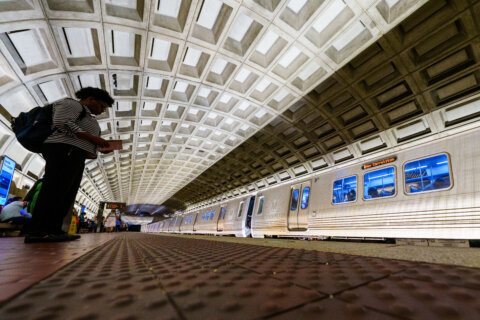This video is no longer available.
While most parts of the country have seen decreases in crime, including violent crime, that has not been the case in D.C.
After finishing 2023 with big spikes in homicides, carjackings, car thefts and other violent crimes, the chair of the D.C. Council’s public safety committee wants to move aggressively to start 2024.
On Wednesday, Ward 2 council member Brooke Pinto unveiled a roughly 90-page “omnibus” package aimed at addressing public safety.
None of the more than 100 proposed changes to the criminal justice system are necessarily new.
Much of the legislation has been proposed already as stand-alone measures, though in some cases, there have been changes made from the original proposals.
All of it has been discussed publicly in council hearings and during the numerous events Pinto has held across the city to discuss public safety.
“We have an emergency in the District of Columbia with public safety right now, especially with access to illegal firearms and firearm offenses,” Pinto said.
Her plan, which she calls “Secure DC,” aims to address what she called “gaps” in the criminal justice system. It tacks on larger maximum sentences and makes permanent a relatively new offense called “endangerment with a firearm,” which covers instances when someone starts shooting a firearm indiscriminately in public.
It also makes it illegal to discard a firearm or ammunition, or to knowingly possess or receive a firearm that’s had its serial number tampered with.
It also expands the legal definition of a “carjacking.”
Right now, victims have to be forced out of their vehicles to warrant that charge. Technically, even if someone is standing at a gas pump or outside their car and someone points a gun at them to take it, it’s considered auto theft. Under Pinto’s proposal, that would change.
“If you are within the vicinity of a vehicle, and it’s visible to you, that is considered carjacking,” under this bill, Pinto said. “We have to treat these cases with the severity that they deserve and the harm that they’re causing District residents and victims.”
Also included in the bill are provisions that:
- Increase the maximum penalty for those who fire a large number of bullets at one time, and requires sentences of up to five years for possessing a machine gun to be added on top of other penalties, rather than running concurrently with convictions for other offenses
- Authorize controversial “drug free zones” for up to 120 hours in the city, though with some exceptions
- Target organized retail theft, including a lowering of the threshold for felony retail theft to $500
- Prohibit the wearing of masks on public property or during demonstrations by anyone older than 16 who could engage in civil or criminal violations, giving police the right to stop someone or a group of people wearing masks at a time when suspicions could be raised
- Expand the definition of “significant bodily injury” and “serious bodily injury” for felony assault cases, while also creating a felony strangulation law
- Would include a penalty enhancement for violent crimes committed against transportation workers, seniors and adults with disabilities
- Give police the right to arrest someone if they refuse to cooperate after getting stopped for fare evasion on Metro
- Presume both adults and juveniles arrested for violent crimes should remain detained pending trial, though it still provides a judge with some discretion. However, if a judge sides with a defendant who argues against it, they would be required to write a written statement explaining why, in an effort to be more transparent.
But Pinto’s bill also goes beyond the punitive.
If passed, her bill would create a pilot “blue light” program in the city.
Each ward would get one emergency communication and video surveillance system that would start recording when activated. The blue lights would be similar to what many college campuses already have. A new law outlawing “cash free” businesses would also be delayed by a year.
Several of the provisions could take effect almost immediately, though others that would require funding would take longer to implement. That includes the creation of a hospitality job training program at the D.C. jail and a requirement that inmates there be offered more access to fresh fruits and vegetables.
Pinto’s hope is that it finds the right balance between being “responsive to the moment” while also being sustainable for long term public safety.
However, some provisions of the bill have already garnered criticism, including the creation of “drug free zones” and changes to police reform measures passed not that long ago.
“We deserve to be safe from crime and from abuse of power. Allowing officers to escape accountability and to harass people in designated zones will not make D.C. safer. Locking more people up before they are found guilty will not make D.C. safer. These types of provisions in the Secure DC Act are not ‘public safety’ solutions; they are measures that open the door for abuse of power,” ACLU-D.C. Policy Counsel Melissa Wasser said.
If the package is approved, D.C. police would also be able to start pursuing vehicles when there’s an imminent danger, while clarifying prohibitions on neck restraints.
Pinto said officers are too often disciplined for what she described as incidental contact to the neck area when making an arrest, jeopardizing the case and the officer’s ability to testify in future cases. Chokeholds and asphyxiation would still be illegal.
Nonetheless, Pinto is vowing to move quickly to pass the legislation. She expects a debate and final vote in the council’s Committee on the Judiciary and Public Safety next Wednesday, Jan. 17, and hopes an initial vote by the council would come the following week. Her goal is to have a final vote by next month.
“I imagine my colleagues, like me, hear from residents every single day about people’s concerns — justifiable concerns about the state of public safety in the District right now,” Pinto said.
While she wouldn’t say how much outreach she’s done with other members of the council, she stressed how everything in the bill has been discussed before. She repeatedly said words to the effect of “now it’s time to vote,” and expressed hope that the votes would be there to pass.
If it’s passed, D.C. Mayor Muriel Bowser issued a statement saying she is eager to sign the bill and hopes the council will “move with urgency to unanimously pass” the legislation.
“It is important that we pass this package,” Pinto said. “Residents are demanding and expecting a safe city. They have a right to be in a safe city and we can no longer wait. We need to pass Secure D.C. as one package.”
Violent crime jumped in several American cities during the COVID-19 pandemic and lockdown. But while homicides have dropped post-pandemic in places like New York City, Chicago, Philadelphia and Baltimore, the trends have only accelerated in Washington.
The Associated Press contributed to this report.
Get breaking news and daily headlines delivered to your email inbox by signing up here.
© 2024 WTOP. All Rights Reserved. This website is not intended for users located within the European Economic Area.








